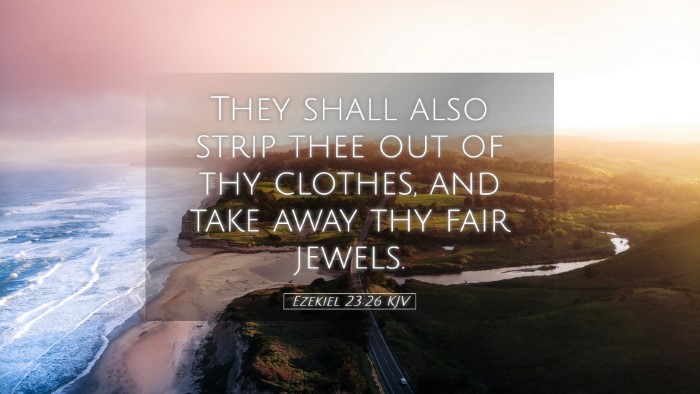Commentary on Ezekiel 23:26
Ezekiel 23:26: "And they shall also strip thee out of thy clothes, and take away thy fair jewels."
This verse resides in a larger prophetic context where the themes of betrayal, judgment, and restoration unfold vividly in Ezekiel's allegorical representation of the two sisters, Aholah and Aholibah, which symbolize Samaria and Jerusalem, respectively.
Contextual Overview
The chapter speaks of the unfaithfulness of Israel (symbolized by the two sisters) to God. The imagery of adultery serves to express the spiritual fornication of the Israelites as they chased after foreign gods and alliances.
Insights from Public Domain Commentaries
Matthew Henry's Commentary
Matthew Henry emphasizes the drastic consequences of sin illustrated in this passage. He expounds on the stripping of clothes as symbolic of the loss of honor and dignity that comes with sin. Just as nakedness represents vulnerability and shame, so too does Israel’s infidelity result in spiritual and national humiliation.
Henry notes that the "fair jewels" symbolize the gifts and blessings that were bestowed upon Israel by God, which were misused or misplaced in their pursuits of idolatry. This loss is twofold: it represents the physical and spiritual desolation that results from unfaithfulness.
Albert Barnes' Notes on the Bible
Barnes highlights the prophetic nature of Ezekiel's message, indicating that this "stripping" signifies both the taking away of Israel’s resources as punishment and the stripping away of their pride and self-exaltation. The capturing of the beauty of Israel serves to illustrate divine judgment against those who turn away from God.
Furthermore, this imagery draws a parallel between the loss of beauty and societal standing and the eventual downfall of the nations surrounding Israel. Barnes points out that while this verse indicates immediate judgment, it also serves a broader prophetic role in the continuing narrative of Israel’s restoration.
Adam Clarke's Commentary
Clarke provides a thorough interpretation of the cultural significance behind the nakedness and the taking away of jewels. He connects the stripping of clothing to a stripping of national identity and spiritual integrity—elements especially vital to the Hebrew understanding of community and relation to God.
Moreover, Clarke emphasizes the importance of repentance in the face of judgment. He suggests that this stripping away can also be seen as a call for Israel to return to the paths of righteousness, shedding the falsehoods of their past associations and turning back towards covenant faithfulness.
Theological Implications
This passage carries profound implications for understanding divine judgment and mercy. The stripping away of clothing and jewels serves as a metaphor not only for loss but also as an opportunity for reflection and repentance. It invites theologians and scholars to explore the dual nature of God's justice and grace.
- Judgment as a warning: The actions described serve as a somber reminder of the consequences of forsaking one’s first love—God.
- Call to restoration: In the midst of destruction and loss, there remains the hope for restoration, as God’s covenant faithfulness stands eternal.
- Identity in Christ: For New Testament readers, this passage provides a backdrop against which the fullness of identity is understood in Christ, where believers are clothed with the righteousness of God through faith.
Application for Pastors and Bible Scholars
Pastors may draw practical applications from this verse, encouraging congregants to evaluate where they may have strayed into spiritual unfaithfulness. The vivid imagery serves as a catalyst for teaching about the beauty of God's covenant relationship with His people, highlighting both the dangers of idolatry and the assurance of God’s redemptive plan.
Bible scholars may delve deeper into the historical context of Ezekiel's time, exploring how ancient Israel’s interactions with surrounding nations shaped their identity and faith. This could lead to fruitful discussions on the parallels seen in contemporary society concerning fidelity to God's calling versus cultural distractions.
Conclusion
Ezekiel 23:26 serves as a powerful reminder of the high cost of spiritual unfaithfulness. The stripping of clothes and jewels encapsulates both judgment and an invitation to repentance. Through the depths of divine consequence, there lies an ever-present hope for redemption, inherent in God's nature. The community of believers is called not just to reflect on this singular verse, but to consider the overarching narrative of fidelity to God throughout Scripture.


